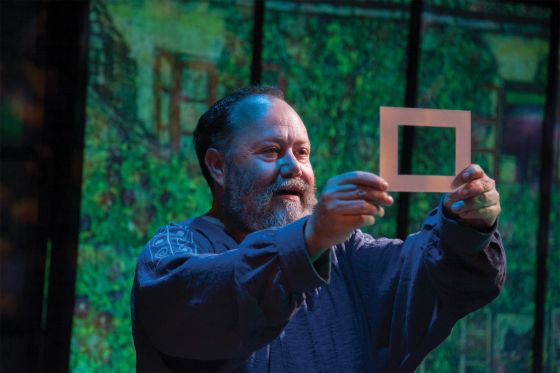
The stage contains a room identifiable as an artist's studio only by its array of easels and canvases. A door leads to a sunny garden; tea and coffee-making appliances are in evidence, along with indications of resident felines. The owner of this cheerful habitat is a portly man of middle age, wearing a voluminous caftan and a full beard, whose first words to the waiting visitor seated unseen among us are to apologize for his tardiness. At this point, playgoers may be asking themselves if this can really be Gustav Klimt, the notorious Symbolist painter whose murals for the University of Vienna were withdrawn upon their completion after spectators declared them "pornographic," who was rumored to have fathered 14 children while remaining a lifelong bachelor, and whose picture titled "The Kiss" is as universally recognizable as the Mona Lisa. Soon, however, as he chats with the young woman he is sketching — pursuant to persuading her fiance to order a portrait of the bride-to-be — we learn his views on marriage (he rejects it), on art (it can change the world), and the best method for achieving the latter. This involves flirtatious banter interrupted by the would-be seducer's preoccupation with his beloved confidante, Emilie Flogge, who refuses to give up her career and independence. Such are the conflicts suffered by simultaneously subscribing to the notion of unrestricted sexual freedom for all genders and the Platonic ideal of a single predestined companion. Exacerbating our hero's dilemma in The Portrait is the news that his latest paramour is pregnant. Should he surrender to conventional morality and make her his wife, or endure guilt over inflicting distress as the result of an innocent fling? More troubling, should he share his ambivalent feelings with Emilie (the only woman "who truly understands me") and risk the loss of her friendship? Small wonder that his interest in his silent model comes off as less inspired by libidinous urges than the need of a sounding-board for his internal debate. A theater audience can easily substitute for a character's imaginary one, but when that audience is understood to consist of a single immobile individual, solo-show actors face additional challenges. Fortunately, Cameron Pfiffner never falters in the locating details of his environment, whether addressing his cool-cookie customer, soliloquizing to his absent muse, introducing his (many) cats, or caroling an impromptu "Questa Quella." In the end, playwright Susan Padveen's — well, portrait — of this intensely private artist emerges as intimate and revealing as those displayed in a shifting gallery of slide projections acquainting us with the manifestations of thwarted happiness in geniuses.
